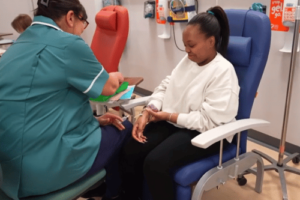 This week saw the announcement of a new genetic test to better match future blood transfusions and reduce the risk of side effects for people with inherited blood disorders. The NHS is the first healthcare system in the world to provide this new blood group genotyping test. The DNA analysis of a patient’s blood groups will allow for more accurate matching for people who need transfusions and help find blood for patients with complex requirements. Donor blood will also be tested.
This week saw the announcement of a new genetic test to better match future blood transfusions and reduce the risk of side effects for people with inherited blood disorders. The NHS is the first healthcare system in the world to provide this new blood group genotyping test. The DNA analysis of a patient’s blood groups will allow for more accurate matching for people who need transfusions and help find blood for patients with complex requirements. Donor blood will also be tested.
Being interviewed as part of the launch of the new test, Ryan Mullally, consultant haematologist at Whittington Health NHS Trust, said: “We can learn more and develop better blood matching by using this exciting new world-leading test. We are keen to raise awareness of it among patients and specialist medical and nursing teams involved in their care.”
In North Central London, around 1,200 adults live with sickle cell disorder and nearly half report having accessed urgent or emergency care within the last six months.
Blood transfusions are commonly used to treat rare inherited blood disorders, but about a fifth of patients develop antibodies against certain blood groups afterwards. To help improve blood-matching and reduce the risk of antibodies developing, we are encouraging patients with sickle cell, thalassaemia and transfusion-dependent rare inherited anaemias to have this test taken alongside their routine hospital blood tests.
Stephanie George, 32, was one of the first patients to receive a “blood matching” genetic test at Whittington Hospital in north London. “I do think the new test will be really great,” she said. “This illness has been around for such a long time and I’m glad the technology is starting to catch up, because patients need it.” She has been having blood transfusions for more than 20 years and receives them around every six weeks.
Sickle Cell Disorder (SCD) is one of the most prevalent genetic conditions affecting around 17,000 patients in England with 250 new cases per year (80% of them in London). Sickle Cell Disorder is a serious and potentially life-limiting condition. The condition can cause a variety of health problems due to red blood cells forming the “sickle” shape, reducing blood flow to organs and causing chronic low blood counts. This can lead to episodes of severe pain and other complications. SCD is particularly common in people with an African or Caribbean family background.
Across North Central London, we want people living with red cell disorders to have the confidence that we are investing in their care, both in community and acute settings, and in staff training and that we will be there in their time of need.
A new hyper-acute model for people living with sickle cell disease and enhanced community services across North Central London for all red cell patients are being set up to improve access to personalised care, advice and support patients to best manage these lifelong conditions.
NHS chief executive Amanda Pritchard said: “Being able to provide high quality clinical care to people with inherited blood disorders is an important step in helping to reduce health inequalities and this innovative test will greatly improve quality of life for people living with these disorders. I urge those eligible to ask their clinical teams about the test and to accept if they are invited to take part.”
Sara Trompeter, NHS Blood and Transplant Consultant Haematologist, said: “Knowing the extended blood groups of patients, alongside the similar programme in the donor population is a necessary step to improve the ability to match blood for our patients, improving transfusion care. The initiative will rely on patients attending hospital and having their blood sent to NHS Blood and Transplant for testing. We strongly encourage clinical and laboratory teams to work with patients to support this programme.”
John James, Chief Executive of the Sickle Cell Society, said: “We welcome this significant advancement in enhancing care for individuals with sickle cell disorder.
“Blood transfusions continue to be crucial in the treatment of sickle cell disorder, and our ‘Give Blood Spread Love’ campaign has been encouraging blood donation among individuals of black and mixed heritage.
“With the introduction of this innovative test, we take a remarkable stride towards achieving better blood matches for all those living with the condition. We urge individuals with sickle cell disorder to have the blood test as it will not only support more accurate treatment but also hold the potential to save more lives in the future.”
Roanna Maharaj Public Health, Education and Patient Advocacy Lead at the UK Thalassaemia Society, said: “We wholeheartedly support the progressive decision to offer blood group genotyping to all individuals living with thalassaemia in England. This new initiative will help individuals living with thalassaemia receive blood transfusions that are better matched to their needs to reduce the risk of transfusion reactions and other serious complications.
“We encourage individuals with thalassaemia and other inherited anaemias to consider getting the new DNA typing test, as it holds the promise of shedding light on your unique blood group genetic makeup, allowing for personalised blood matching care in the future and better management of your condition.”
